Theoretical and methodological issues. Рубрика в журнале - Economic and Social Changes: Facts, Trends, Forecast
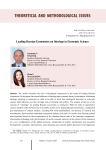
Leading Russian economists on ideology in economic science
Статья научная
The article considers the role of ideological component in the works of leading Russian economists. In this paper the mutual influence of ideology and economic theory is considered. Addressing ideology explicitly is important in order to be able to track how ideological processes in economic science itself influence our lives through ways of thinking and politics. The analysis of the use of the concept of “ideology” by leading Russian economists is conducted. With the help of quantitative content analysis of the formed base of scientific articles of 21 leading Russian economists, a categorical grid (dictionary) of content analysis, including 406 word-combinations, was formed. To identify key microthemes, factor analysis (principal component analysis) was used; as a result, nine thematic groups were identified based on the interpretation of the obtained factor loads of the principal components: relationship of ideology with the formation of world economic patterns in the context of the formation of a new configuration of the global economy; relationship of market mechanisms and economic development; economic reproduction, state planning and control; global dominance and hegemony of the United States; state regulation with an emphasis on issues of entrepreneurship and capital reproduction and public interests; liberal globalization in the context of international cooperation and social responsibility; administrative reform, regulation and executive power of the Russian Federation; development of information technologies and information economy in the context of meeting needs, decision-making and organization of production and regional and spatial development of Russia. The analysis of microthemes from texts of leading Russian economists, using in explicit form the concept of ideology, allows showing the influence of the ideological component on positive and normative aspects of research within the framework of Russian economic science.
Бесплатно
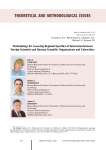
Статья научная
The article examines the features of interactions between Russian scientific organizations and universities and foreign scientists. Despite the effort to collect and compile data on different types of international interactions between scientists, Russian academic literature does not pay sufficient attention to the activities of foreign scientists working in Russia. Therefore, the purpose of the study is to close the gaps in scientific knowledge connected to the research on academic mobility including identification of types and features of interactions between Russian scientific organizations and foreign scientists, to discover the connection between academic mobility and productivity of scientists, and to improve methods of arrangement for the data related to the status and performance of the academia. To accomplish this goal, we propose a methodology for monitoring the interaction of Russian organizations with foreign scientists. We carry out the monitoring taking into account the priorities formulated in the Strategy of Scientific and Technological Development of the Russian Federation (hereinafter - STD Strategy of Russia). The monitoring provided the data about the quantity of foreign scientists, who visited Russian scientific organizations and higher education institutions in 2018 and 2019, the statistics on the distribution of foreign scientists working in Russia by age groups, by scientific fields, by types of interaction, and by Russian regions. The following issues require thorough consideration: the choice of parameters for assessing the work of educational and scientific organizations and the need to take into account priorities of STD Strategy of Russia for monitoring and evaluating the interaction between Russian organizations and foreign scientists, the presence or absence of stable links between the mobility of scientists and their scientific productivity, the absence and fragmentation of data on foreign scientists working in Russia, and flaws in the methods for collecting and monitoring such data. The methodology has been tested using data from previous surveys. Following the test, we propose specific steps for improving data collection on broad participation of Russia in global science processes. The obtained results can be used by private and state organizations, including the management of higher education organizations, heads of scientific organizations (scientific departments), which will serve as the basis for accurate positioning of Russia on the world map of scientific and technological cooperation.
Бесплатно
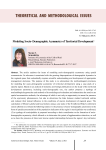
Modeling socio-demographic asymmetry of territorial development
Статья научная
The article explores the issues of modeling socio-demographic asymmetry using spatial econometrics. Its relevance is associated with the growing disproportions of demographic dynamics in the regional space that undoubtedly requires scientific understanding and development of appropriate management decisions. The purpose of this study is to substantiate the methodological provisions for modeling the socio-demographic asymmetry of territorial development using a case-study of a specific region. Based on an analysis of domestic and foreign publications on the study of the territorial development asymmetry, including socio-demographic one, the author proposes a typology of methodological approaches and methods of its modeling and evaluation and substantiates the need to use spatial econometrics methods, the advantage of which is not only an opportunity to assess the presence of the asymmetry phenomenon, but also to determine the links between studied territorial entities and evaluate their mutual influence in the conditions of uneven development of regional space. The calculation of Moran’s global and local indices using a case study of the Sverdlovsk Oblast’s settlement system allowed us to obtain the following results: (1) the presence of socio-demographic asymmetry in the form of spatial autocorrelation of the population indicators of the region’s municipalities was confirmed; (2)a typology of municipalities is proposed according to their contribution to the formation of socio-demographic asymmetry, which allowed us to determine the points of agglomeration attraction, as well as to show the presence of direct and inverse spatial relationships between the region’s key territories; (3) the author substantiates the trend of increasing socio-demographic asymmetry in the region as a result of the increasing role of the Yekaterinburg agglomeration and the decline in the value of other two attraction points in the settlement system. The results obtained can be used by interested specialists to justify measures to regulate the socio-demographic and spatial development of the region by using positive and leveling negative effects of the socio-demographic asymmetry.
Бесплатно
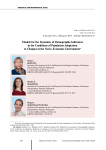
Статья научная
Socio-economic development of any territory is inherently connected with population reproduction, which is predetermined by demographic behavior. Recently, the models for the dynamics of Russia's demographic indicators have been changing, which is characterized by a decrease in the birth and death rates, as well as a relative stabilization of the migration situation. The transformation of demographic dynamics models is a natural result of society's adaptation to the new socio-economic reality. The changes in the behavior of the population are particularly noticeable under the conditions of abrupt transformations of the external environment, observed in the transitional periods of socioeconomic systems functioning. In this regard, the purpose of the study was to determine the main models of the dynamics of demographic indicators of the Russian Federation at the present stage of development, which is characterized by a rapid change in the conditions of life activity. Based on the use of the concept of adaptation in the “human-environment” coordinates, we showed the two-dimensional adaptation of the population to changes in the external environment and constructed a decision-tree for the acts of demographic behavior. In empirical part of the study, using methods of logical and statistical analysis, we studied the dynamics of indicators of reproductive, self-preservation and migration behavior of the population in the period from 2000 to 2019, using, respectively, a set of indicators of birth rate, mortality, life expectancy and migration growth. Based on highlighting the specific characteristics of Russia's socio-economic development in 2000-2006, 2007-2015, and 2016-2019, we identified three stages of demographic indicators dynamics, in accordance with which we proposed three models of demographic indicators dynamics, in order to expand our understanding of this phenomenon. The results obtained allowed us to form a methodological basis for future interdisciplinary research in the field of demographic behavior. They can also be used as a methodological basis for the development of demographic policy measures.
Бесплатно
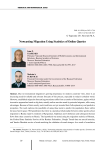
Nowcasting migration using statistics of online queries
Статья научная
Due to international migration’s growing importance in modern countries’ lives, there is an increasing need for reliable and relevant forecasts of this process, especially in today’s turbulent world. However, established migration forecasting procedures suffer from a number of limitations, against which innovative approaches based on big data, notably online searches made by potential migrants, offer many advantages. Because of their novelty, such tools have not yet revealed their full explanatory and predictive properties. The work explores the possibility of using these tools to predict the population flows within the post-Soviet space. We hypothesize that there is a statistical relationship between online queries about migration to Russia made by residents of Kyrgyzstan, Tajikistan and Uzbekistan and subsequent human flows from these countries to Russia. The hypothesis was tested using the migration statistics of Rosstat, the Federal State Statistics Service of the Russian Federation, Google Trends data on search intensity, and Yandex Wordstat service of word matching for validation of search images. As a result of correlation and regression, we found a moderate dependence of the dynamics of human flows on previous queries, which is most evident at a lag of 6-9 months and at zero lag. Obtaining more accurate results in this and similar studies is hindered by the initial limited predictability of migration behavior due to its contextual, sometimes situational and irrational nature, as well as “noisiness” of statistics of queries and often the flows themselves. The search for universal algorithms of determination of relations between queries and migration flows is seen as the main direction of research in this field.
Бесплатно
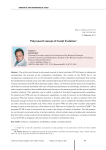
Polycausal concept of social evolution
Статья научная
The article puts forward a polycausal concept of social evolution (PCSE) based on taking into consideration the structure of the competition mechanism. The novelty of the PCSE lies in the simultaneous consideration of a set of interrelated variables of the competition mechanism that exclude the establishment of simple cause-and-effect relationships typical of monocausal theoretical constructions. A structural scheme of the PCSE includes the subject, object, environment and the process of competition; all of them are directly associated with such civilizational phenomena as technology, institutions, culture and ecosystem; together, these variables determine the nature of economic growth and the type of capitalist (market) relations. This approach can be called a method of structural (organizational) competition. To illustrate the PCSE and test its explanatory capabilities, we look for answers to the following classic questions: Why has human civilization matured in Eurasia rather than in other continents? How did humanity manage to break out of the Malthusian trap? How can we explain the Needham Puzzle? Why are some countries and peoples rich, while others are poor? Why do some poor countries and peoples manage to catch up with rich ones, while others do not? How can we explain the “case of the USSR”? The proposed PCSE is used to reconstruct key events in the history of human civilization. For this purpose, we put forward a structural outline of social evolution, which includes basic principles and mechanisms that determine certain results of the development of human societies. In conclusion, we make an attempt to use the PCSE to designate reference points of a modern civilizational crisis.
Бесплатно
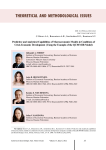
Статья научная
The article deals with the use of econometric macromodels for solving applied problems to substantiate economic policy. The questions of the applicability of econometric methods for modeling economic processes are considered. The requirements for the key qualities of complex macroeconomic models are being formed. Emphasis is placed on the fact that it is econometric modeling based on large amounts of data that contributes to a deep analysis of the causal relationships existing in the economy. As an illustration, we use the description of the quarterly macroeconomic model QUMMIR, which has been used for a decade and a half at the Institute of Economic Forecasting of the Russian Academy of Sciences for medium-term forecasting. It is shown that in conditions of increasing economic uncertainty, the importance of analyzing scenarios of socio-economic development and substantiating economic policy measures aimed at tapping the internal potential of economic development increases. We argue that the use of advanced predictive and analytical tools can significantly improve the quality of forecast estimates and the validity of decisions made on their basis. The structure of the model is described in detail with an emphasis on budget and financial blocks. The final part of the article provides an example of using a quarterly macroeconomic model to analyze decisions in the field of fiscal and monetary policy. Calculations demonstrate a positive impact on the dynamics of GDP on the part of budget system expenditures in the absence of a significant effect on the growth of inflation. In terms of monetary policy, calculations demonstrate its relative neutrality in relation to economic dynamics, as well as the exhaustion of the positive impact on the economy in the current conditions due to the weakening of the ruble exchange rate.
Бесплатно
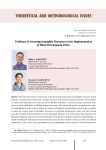
Problems of assessing intangible resources in the implementation of rural development policy
Статья научная
The relevance of the research is due to the increasing importance of intangible resources, which today are considered as fundamental, strategic resources of territorial development policy. This problem is of particular importance for rural areas of the Russian Federation, which are facing a structural crisis and, as a result, difficulties in fulfilling national functions. The aim of this article is to present the results of methodological work on the creation of a system of subjective social indicators that make it possible to assess the current state of intangible resources for territorial development policy and their testing using the example of rural settlements in the Krasnodar Territory. The article shows how, based on the allocated intangible resources for the development of territories and their substantive characteristics, a system of subjective indicators has been formed to assess the state of these resources at the level of local communities. The results of the approbation of the methodology on the example of rural settlements of the Krasnodar Territory are presented. The study covered 12 rural settlements from six municipal districts. The results showed that the current state of intangible resources depends not so much on the level of development of individual settlements as on the level of development of the municipal areas in which they are included. It has been established that the first-order resources – the basic activators of the territorial development process – human potential, local identity and leadership have a higher development level. The assessment of second- and third-order resources indicates the need to strengthen efforts to activate them. The proposed methodology can be used as a tool for diagnosing the state of intangible resources in the implementation of territorial development policies at the “entrance” and “exit”, as well as a tool for regular monitoring
Бесплатно
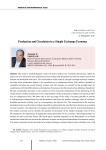
Production and circulation in a simple exchange economy
Статья научная
The article is methodological: it does not seek to analyze new economic phenomena; rather, its major aim is to study how these phenomena were formed and developed and how the market system was formed and developed with them. The actual subject of the study is a simple exchange economy model at the stage when production begins to be considered as its endogenous factor. This makes it possible to smoothly introduce the social division of labor into the analysis, to consider in the simplest form its combination with the differentiation of production functions in the framework of an individual household. We pay considerable attention to the analysis of socio-economic implications of the deepening of the social division of labor manifested in the transformation of the production of objects and means of labor into its independent links. We show why at this very stage of the study it becomes possible to provide a well-grounded substantiation for the mechanisms that form the market exchange value of consumer durables and means of labor, and, as a consequence, the interest rate. The introduction of the resource limitation factor into the analysis makes it possible to substantiate the need for the institution of ownership of such resources, the importance of absolute and differential natural rent for the normal functioning of the market economy, and to identify the specifics of formation of the market exchange value of land. We emphasize the importance of making the spatial dimension of the economy a full-fledged subject of analysis for pure economic theory. We touch upon a possible approach to the formulation of an initial model that would take into account the influence of space on the general parameters of economic activity. The main conclusion is that the model of a simple exchange economy helps to form a holistic view of all key categories (albeit in embryonic forms) reflecting the action of the market mechanism. At the same time, it becomes clear why further institutional transformations are required to realize all the potentials available in this form of economic activity organization.
Бесплатно
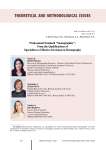
Статья научная
To resolve various strategic and tactical tasks in government and regional agencies, units of municipalities, analytical centers and other non-profit organizations, demographers with considerable expertise are required who can efficiently build and study analytic demographic databases, prepare resources for the development of demographic plans, identify demographic trends, conduct expert examinations of economic and socially significant programs. However, it has been difficult for a long time to assess professional qualifications of specialists in demography in order for them to perform their functions efficiently due to the insufficient number of such specialists and their mixed functionality. Departments and centers of demography opened in leading Russian universities helped resolve this issue. It was the appropriate moment to approve the professional standard “Demographer”, which clearly states knowledge, skills and abilities of a demographer at a certain qualification level and functions to perform. However, organizational and methodological issues related to assessing the quality of received training in demography to perform job functions, depending on the position and the organization in which the specialist works or plans to work, require particular attention, which determines the relevance of the studied topic. The aim ofthe research is to develop organizational and methodological aspects ofthe process of assessing professional qualifications of specialists in demography for the qualitative performance of their functions and solving issues of society. The article describes the process of assessment of professional qualifications of specialists in demography by the personnel of the Qualification Assessment Center by conducting an examination that allows assessing not only theoretical knowledge, but also skills and abilities of candidates for the qualification; the importance of using a competence approach as a base for assessing qualifications of demographers is substantiated. As part of the organizational and methodological support for the examination to assess professional qualifications of specialists in demography, recommendations are proposed for the document support of the examination, arrangement procedures of the examination, rules of conduct during the examination, requirements for examinees to pass the examination and obtain a certain qualification level as a demographer. It has been revealed that the increasing qualifications of demographic workers provide higher wages and demand for these specialists in the labor market; a demographer's career chart has been constructed, showing the relationship between the qualification level, position, and wages. The methodological basis is represented by the fundamental provisions of the concept of managerial training. The prospects of the study are to improve the quality of training and assessment of professional qualifications of specialists in demography, which will further influence the effectiveness of creation and implementation of projects for the development of human potential in Russia.
Бесплатно
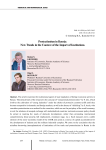
Protectionism in Russia: new trends in the context of the import of institutions
Статья научная
The article examines the institutional aspect of state regulation of foreign economic activity in Russia. Theoretical basis of the research is the concept of “educational protectionism” by F. List, which involves the cultivation of “young industries” under the shelter of protective customs tariffs until they become competitive in domestic and foreign markets; as well as the theory of “delinking” by S. Amin, who considers protectionism as a method for the countries, which are on the periphery of the world economy, to exit the relations of unequal exchange with industrialized countries: national economic policy should be aimed at meeting the needs of domestic development, rather than promoting international competitiveness (food security, full employment, minimum wage, etc.). Such measures were a stable element of the socio-economic model of the USSR and acted as a source of capital accumulation for the development of industry and the military-industrial complex. We come to the conclusion that the mindless borrowing (transplantation) of institutions of free trade and protectionism in Russia in the 1990s, which was not accompanied by the formulation and implementation of state strategic plans for the development of the Russian economy, led to the formation of a “mutant” economic model. On the one hand, the complete abandonment of the policy of state monopoly on foreign trade led to the flooding of the domestic market with imported goods and, as a consequence, massive ruin of domestic manufacturing enterprises. On the other hand, the purpose of the fragmentary application of protectionist policy instruments was not so much to support national producers as to create a comfortable environment for the distribution of state property among a narrow group of people close to the authorities, as well as favoring monopoly capital in a number of sectors of the domestic economy.
Бесплатно
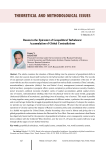
Russia in the epicenter of geopolitical turbulence: accumulation of global contradictions
Статья научная
The article examines the situation of Russia falling into the epicenter of geopolitical shifts in 2022, when the country found itself involved in the hybrid warfare with the Collective West. The novelty of our approach consists in reconstructing key events of the geopolitical competition of the last 15-20 years with the use of an extensive range of related concepts from various fields: economics (Trout’s mistake, neocolonialism), cybernetics (Ashby’s Law and Sedov’s Law), management (external management, hybrid warfare), synergetics (synergetic effect, system complexity), political science (security, freedom, power structure), political economy (Arrighi’s cycles of capital accumulation, global capital center, rate of return), institutionalism (shifting risks from the physical world to the social world), geography (horizontal diffusion of innovations), psychology (war of meanings, war of nerves). This made it possible to bring together many poorly compatible phenomena of different nature, synthesize the concepts used and reveal the logic behind the struggle of geopolitical players for world hegemony. To deepen the analysis, we provide our own typology of world wars and their characteristics. We prove that the special military operation in Ukraine exposed the impasse of Russia’s economic policy and consolidated other countries in a hybrid war against the United States, thereby becoming a key event in history and giving rise to a global geopolitical confrontation between the West and the Non-West. Our main conclusion is that Russia has objectively found itself in the epicenter of geopolitical turbulence, and, consequently, cannot avoid a direct collision with the Collective West; therefore, over the next 15-20 years the country will have to go through all the stages of a new hybrid world war.
Бесплатно
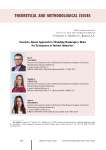
Scenario-based approach to modeling bankruptcy risks for enterprises in various industries
Статья научная
The deterioration of the financial situation of enterprises in various industries, which is currently observed in many regions, creates prospects for reducing their financial stability and the emergence of bankruptcy risks. It is necessary to develop existing methodological approaches so as to assess and forecast the risks of bankruptcy for industries as a whole, rather than for individual enterprises, and form effective state support mechanisms for them. The main goal of our research is to develop these approaches. The novelty of the presented approach consists in the following facts: we develop an algorithm for scenario modeling and forecasting the risks of bankruptcy for industries, including an assessment of the financial stability of the industries under consideration and the probability of bankruptcy; we design regression models showing the dependence of change in the probability of bankruptcy on a whole system of internal and external factors; we conduct autoregressive modeling of the dynamics of internal and external factors using a moving average (ARMA). Autoregressive modeling allows us to form the most probable, inertial forecast scenario for the next five years taking into account the preservation of the noted trends and the corridor of maximum possible values. The forecast values of the dynamics of these factors and the constructed regression models serve as a basis for designing forecast scenarios for changes in the probability of bankruptcy of large, medium and small machine-building enterprises in the Sverdlovsk Region. As a result, we reveal that major machine-building holdings of the Sverdlovsk Region that do not have sufficient working capital, have a low level of solvency, and experience a significant debt burden are most susceptible to bankruptcy risks. In order to increase financial stability and effective development of large machine-building enterprises, government support is required.
Бесплатно
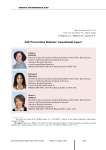
Self-Preservation Behavior: Generational Aspect
Статья научная
The purpose of the research is to identify features of self-preservation behavior in different actual generations of Russians to assess the vector of their transformation and the prospects for life expectancy dynamics. The relevance of the topic is determined by the significant lag between Russia and developed countries in terms of life expectancy, largely due to behavioral factors. The scientific novelty consists in the fact that we can adapt the Strauss-Howe generational theory to study generational characteristics of population behavior related to health. By the results of a sociological survey, we have verified the hypotheses about the nature of self-preservation behavior models of five ten-year-old actual cohorts of the population and the combined generation born before 1955 inclusive. Regarding the ratio of self-preservation behavior models of the two oldest cohorts, the paper does not confirm the formulated hypothesis, which may be due to the positive transformation of health-preservation behavior models as people became older, due to changes in health status, as well as in the population of the older cohorts due to high premature mortality in groups with the most unfavorable lifestyle. Regarding four young actual generations, the study has confirmed the hypotheses showing that favorable socio-economic and demographic conditions, anti-alcohol and anti-smoking measures of the 2000s and promotion of an active healthy lifestyle in general have a positive effect in terms of influencing the nature of self-preservation behavior of young cohorts, which indicates the possibility of influencing behavioral health factors at the stage of its formation. The positive vector of transformation of generational patterns of self-preserving behavior, especially clearly manifested in men, allows us to hope for the restoration and prolongation of the growing dynamics of the life expectancy of Russians with the probability of achieving targets in the future, provided that favorable behavioral patterns in the field of health conservation are consolidated.
Бесплатно
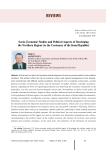
Статья научная
In this work, we show the formation and development of socio-economic studies in the northern periphery. The authors reflect the role of economic science and regional management in the development of territories with difficult natural conditions. During the time of capitalist colonization, socialist planned economy, revolutionary reform and the formation of market relations, scientific recommendations, regarding the forms of organizing production and improving the economic mechanism by the authorities, as a rule, were not received properly and on time. Nevertheless, as shown in the article, all scientific concepts and theories, despite a delay, somehow influenced (and are influencing) vital activity of the population of distant regions, but especially it influences the theory of initial capital accumulation, socialist accumulation, mobilization economy, regional organization of productive forces, economic federalism, a variety of forms of ownership and mixed economy, territorial management. Science forms the theoretical basis for objectively determined social transformations, which serves as a reference point for the accelerated development of productive forces and the growth of people's well-being. However, political activity often ends up in completely opposite positions, preferring to break existing economic relations to the detriment of public interests. On the other hand, the very socio-economic reality and various circumstances of life suggest the need to introduce new theoretical propositions into science, corresponding to the cyclical nature of the market economy, the diversity of its forms, and extreme political and economic situations. At the same time, the experience of the formation of economic
Бесплатно
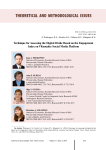
Статья научная
In modern society, social media have become one of the main sources of information. Many local governments began working with the population on social media platforms after this requirement was legally established in December 2022. Without involving the population in the official information agenda, it is impossible to engage them in a constructive dialogue to identify and solve local problems. Due to the difference in experience, Internet communication skills, and time, municipalities cope with this task with varying degrees of success, which indicates a digital divide. The aim of the research is to develop methods for measuring the digital divide in the work of local government on social media using VKontakte social media platform as an example. To do this, the official pages of municipalities in VKontakte were identified, engagement indices were calculated, the influence of socio-economic and other factors on their values was accessed using regression models, and municipal structures were grouped according to the engagement index using cluster analysis. The study covers 615 settlements, 198 municipalities and okrugs of the Northwestern Federal District in the period from 2017 to 2022. The findings indicate that the use of the engagement index to measure the digital divide is practical only within reference groups. It is proved that the value of the engagement index is negatively affected by the number of population, community longevity, proximity to the regional center, and average wage. It is determined that the largest digital divide is typical for a group of settlements with a population of less than 4.1 thousand people. The proposed methods for assessing the digital divide can be used by communications policy administration to evaluate the performance of local governments on social media, build a scaled system of targets, search for best practices and prevent artificial overestimating of engagement levels.
Бесплатно
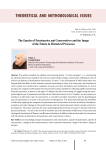
The Epochs of Passionaries and Conservatives and the Image of the Future in Historical Processes
Статья научная
The article considers the problem of structuring history “in time and space”, i.e. constructing its schematic picture (or model) in the form of a small number of large communities, differing in types of culture and patterns of development (structuring “in space”), the development of which takes place over long periods that differ in their semantic content (structuring in time). For a long time, the functions of such a model were performed by categories of socio-economic formations and civilizations. In recent decades, the categories of formations have become less and less suitable for reflecting rapidly transforming historical processes, as shown in the paper. To address the task of structuring, we suggest using the socio-psychological type of passionaries introduced into historical science by Lev Gumilev; we also propose to introduce an alternative type of conservatives. L. Gumilev and other researchers used the psychological type of passionaries as a factor in the processes of ethnogenesis. The paper demonstrates the possibility of effectively applying the categories of passionaries and conservatives as drivers of political, ideological, economic and other changes in the social structure and for structuring much shorter periods of society’s development. The article examines the socio-psychological phenomenon of society’s attitude toward the past and the future - its role in the revival of social life and in the formation of differences in the moral and ideological foundations of Western and Russian civilizations in different historical periods. Its connection with the epochs of domination of passionaries and conservatives is shown
Бесплатно
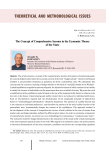
The concept of comprehensive income in the economic theory of the state
Статья научная
The article presents a concept of the comprehensive income of producers of patronized goods; the concept helped to determine the economic content of the term “budget subsidy”, which in the Russian tradition is unreasonably interpreted as gratuitous aid from a paternalistic state. We substantiate this concept and the economic meaning of budget subsidy on the basis of a modified model of the Wicksell- Lindahl equilibrium as applied to patronized goods, the distinctive feature of which consists in their ability to satisfy the interests of individuals and the government that acts on behalf of society. We prove that such a modification of the equilibrium model is based on the use of the marginal utility theory in relation to the key term in the theory of patronized goods: public interest that is not reduced to individual preferences. Such an interpretation required that the absolutization of the marginalist principle of subjectivism based on “methodological individualism” should be abandoned. The presence of a public interest that is not reduced to individual preferences, and therefore the presence of the social utility function of the paternalistic state, fundamentally changes the content of the equilibrium. This approach resulted in the development of the concept of comprehensive income, which is defined as the sum of income from market sales and budget subsidies, deflated by different price indices. In order to summarize components of comprehensive income, we present our own methodology for constructing a “composite price index”. The normative model for budget subsidy based on the assessment of the social utility of patronized goods is the most important practical result of our work. With regard to its normative nature, the article presents a theoretical substantiation of the three normative conditions and derives the corresponding equations for model calculations of the budget subsidy value, tested on the example of national and municipal theaters using actual departmental statistics for the period from 2009 to 2019.
Бесплатно
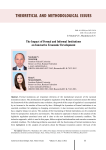
The impact of formal and informal institutions on innovative economic development
Статья научная
Formal institutions are important elements of the institutional structure of the national innovation system. The development of legislative regulation of the Russian innovation system fits within the framework of the administrative state evolution: the growth of the scope of regulation is accompanied by an increase in the number of laws and by-laws. Although the dynamism of formal institutions is an essential condition for adapting to changing environment, it also increases uncertainty and therefore has a negative impact on actors. The analysis of the functioning of formal institutions can be conducted from two perspectives: deductive and inductive. The deductive approach is based on the analysis of the legislative regulation-associated costs and is close to the new institutional economics tradition. The inductive approach, which is used in this paper, follows original institutionalism and narrative economics scholarly tradition. The following problems associated with the functioning of formal institutions have been highlighted in the analysis of narratives about the Russian innovation system: the lack of the necessary legislation, non-complementarity and inconsistency of laws and by-laws, the imperfection of existing legislation, lack of real support for innovations in the formal creation of relevant legal acts, funds and organizations, etc. An econometric modeling of formal and informal institutions influence on the innovative development of the economy has been carried out. Significant variables have been identified including the general indicators of formal institutions and social capital. It leads to the conclusion that the improvement of formal institutions is necessary for the innovative activity development, and high social capital contributes to building trust and, therefore, promotes knowledge sharing and cooperation, which are crucial for innovation initiation.
Бесплатно
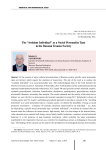
The “avoidant individual” as a social personality type in the Russian Trauma Society
Статья научная
In the context of socio-cultural traumatization of Russian society, specific social personality types are formed, which require the attention of researchers. The aim of the work is to analyze the “avoidant individual” as a social personality type. The methodological basis of the work includes the theories of trauma society (J. Alexander, P. Sztompka, Zh.T. Toshchenko) and the anthroposociocultural approach (anthroposociocultural evolutionism; N.I. Lapin). We used general scientific methods: analysis, synthesis, generalization, induction, formalization, idealization, typologization, generalization, analysis of scientific literature, secondary data analysis. The results obtained and the novelty of the study are as follows: we were the first to demonstrate the heuristic potential of using Zh.T. Toshchenko's theory of trauma society and N.I. Lapin's anthroposociocultural approach to develop a concept of the “avoiding individual” as a social personality type in a trauma society; we showed the possibility of using a crucial protective mechanism - avoidance of traumatic situations experienced by an individual - as a basis for identifying a specific social personality type “avoidant individual”; we defined its features that are formed under the influence of trauma society: high anxiety, lack of a clear image of the desired future, value orientations on material well-being, career, family, health, hedonism, a tendency toward antisocial behavior. It is the presence of post-traumatic motivation, which underlies the value orientations manifested by the respondent, that acts as a criterion for classifying a person as belonging to this social type. The findings of the research can be used for the development of sociological theories of personality, sociology of culture, sociology of management, sociology of social change. It is of practical importance to study the distribution of this type of personality in various social groups, strata and regions of the country. One of the important areas of future research is to analyze the influence of representatives of this type of personality on the social processes taking place in Russian society.
Бесплатно

